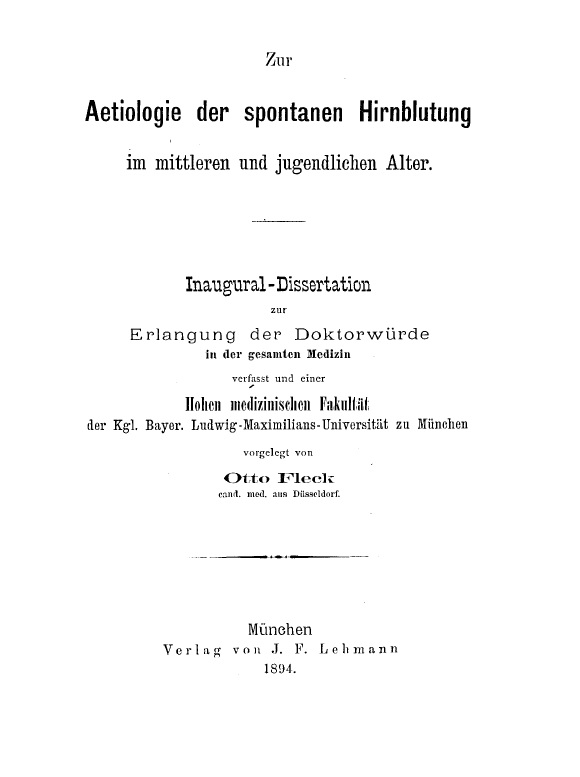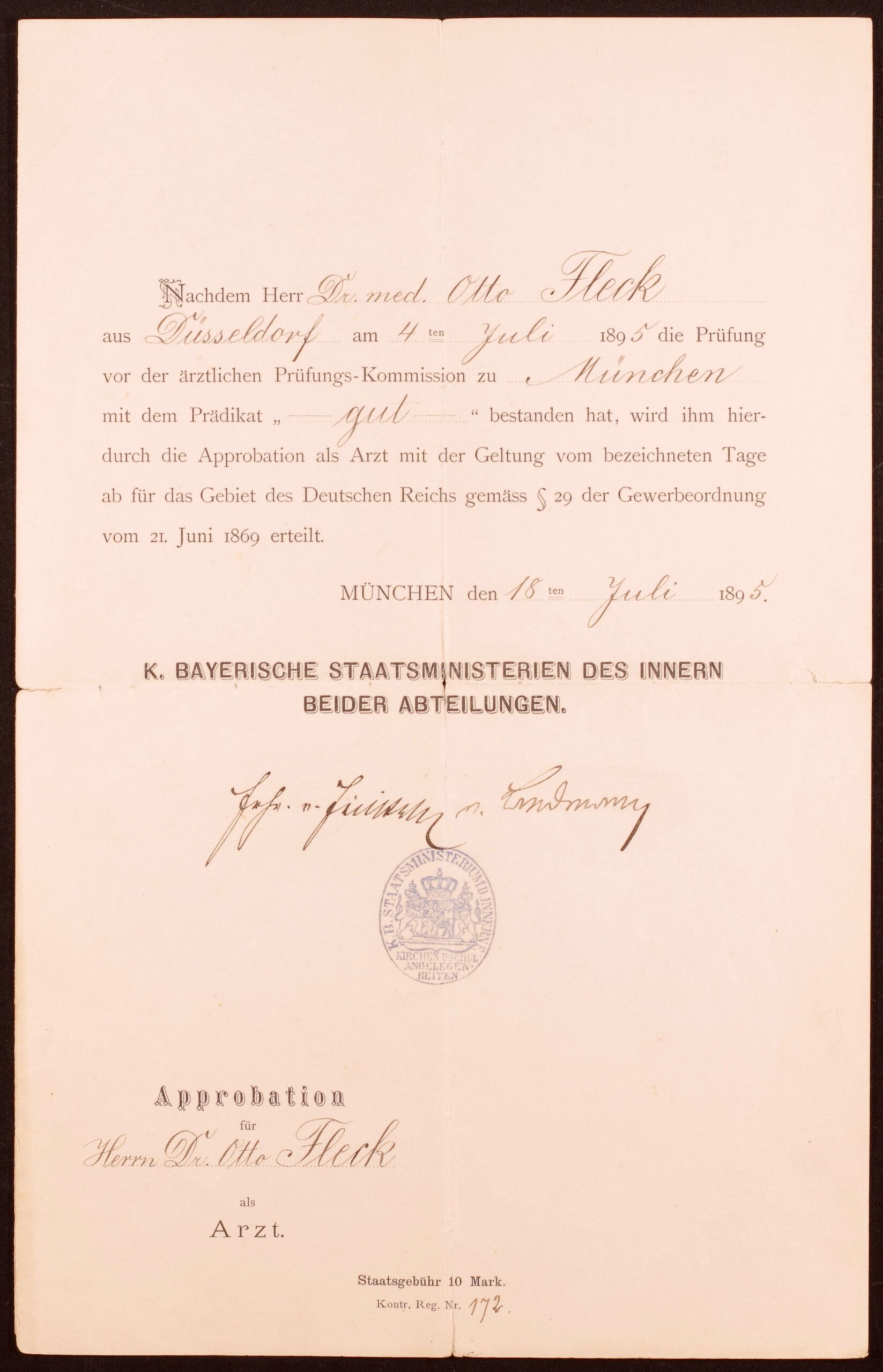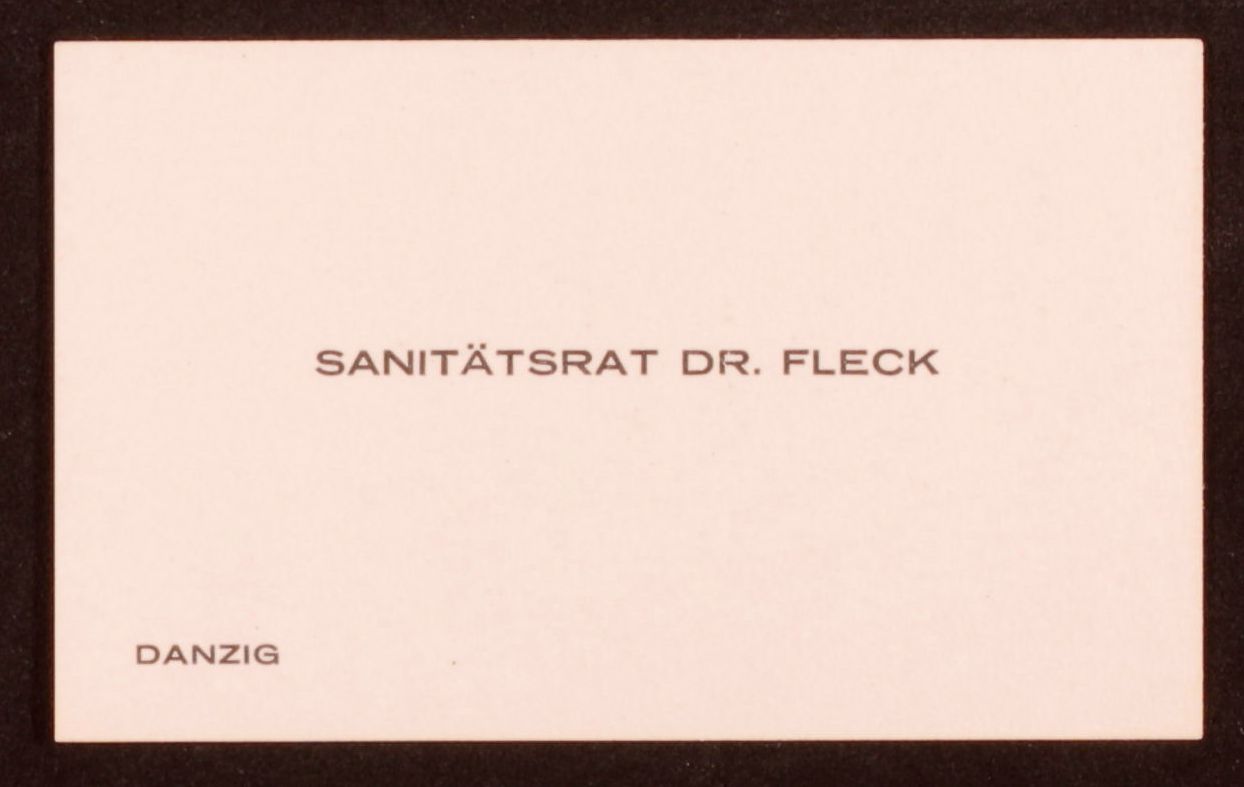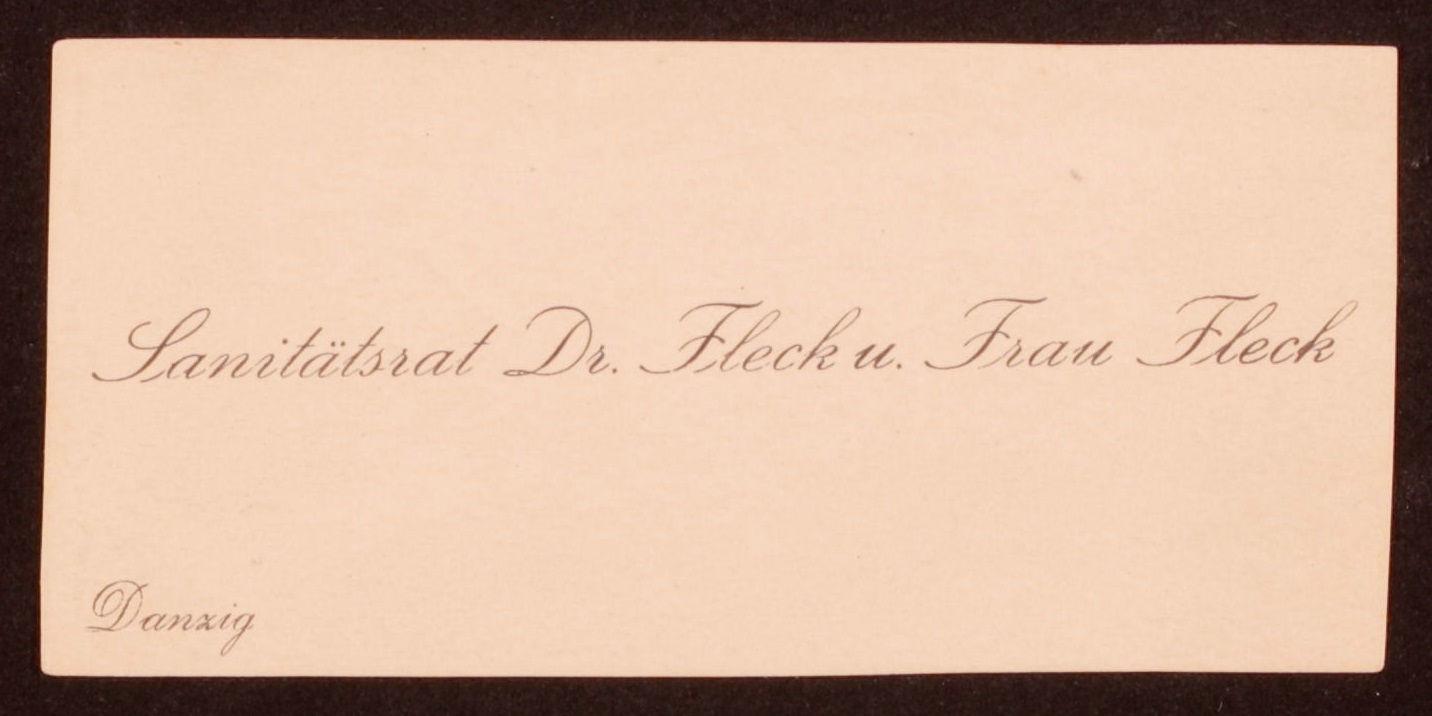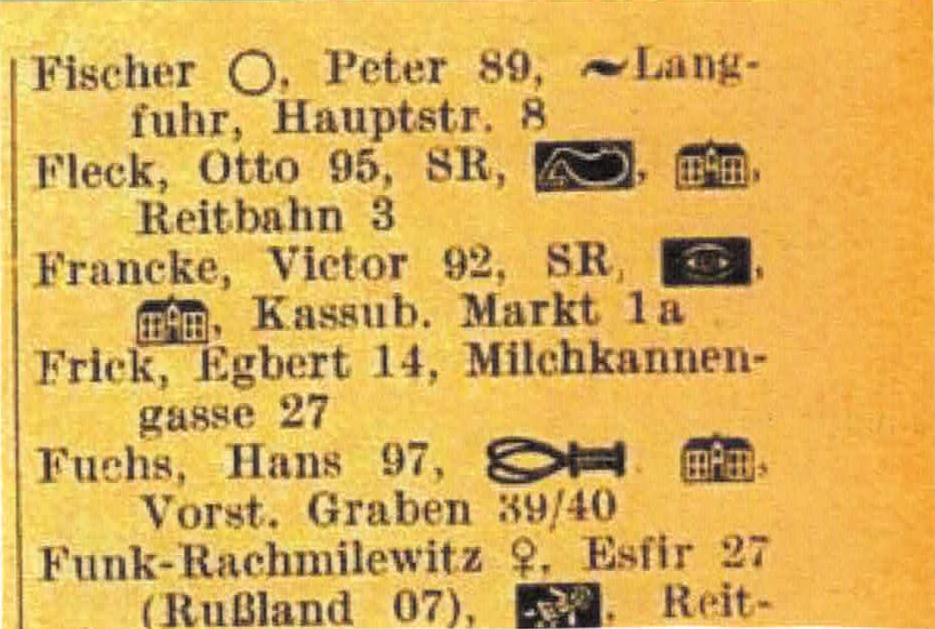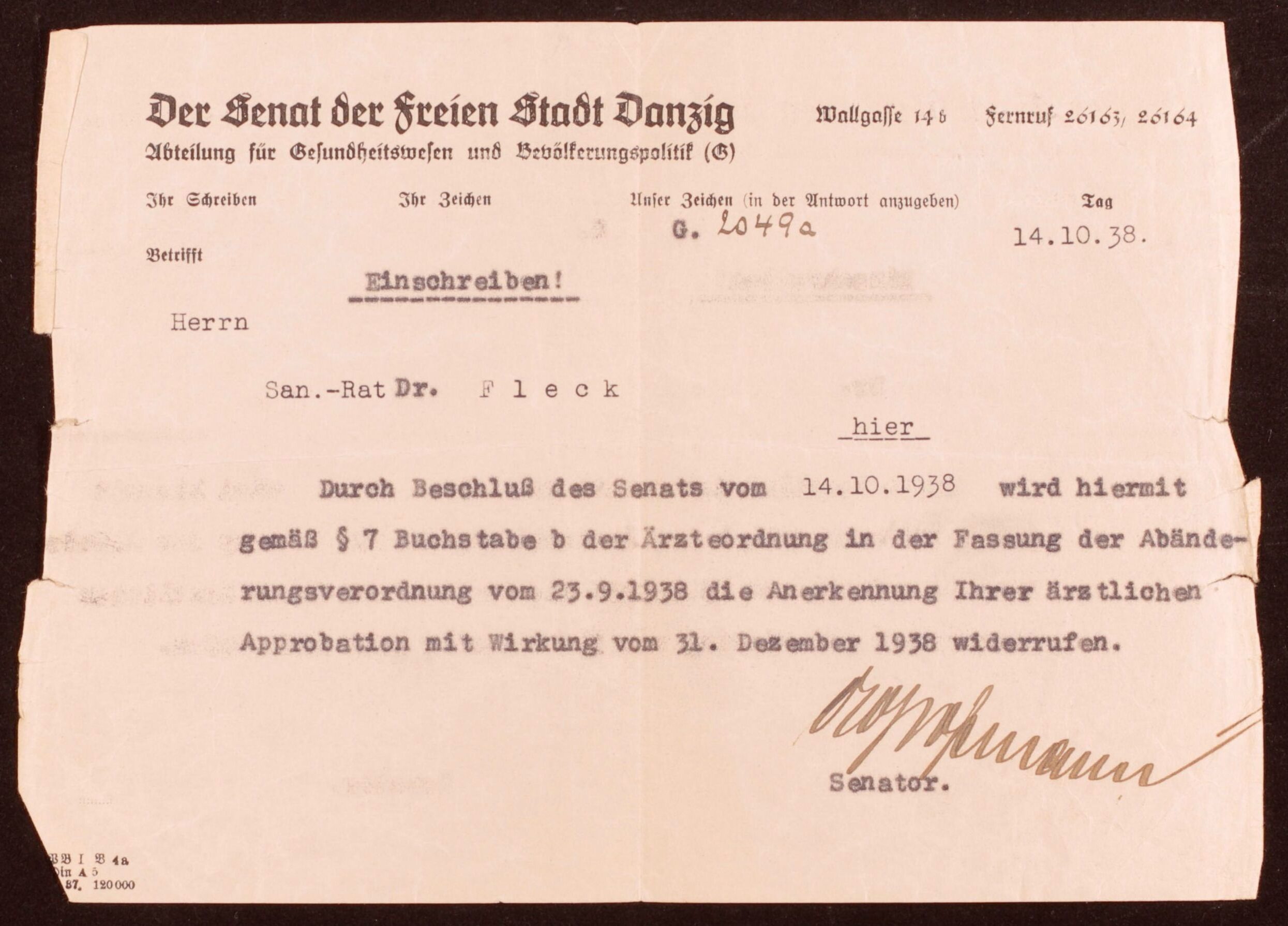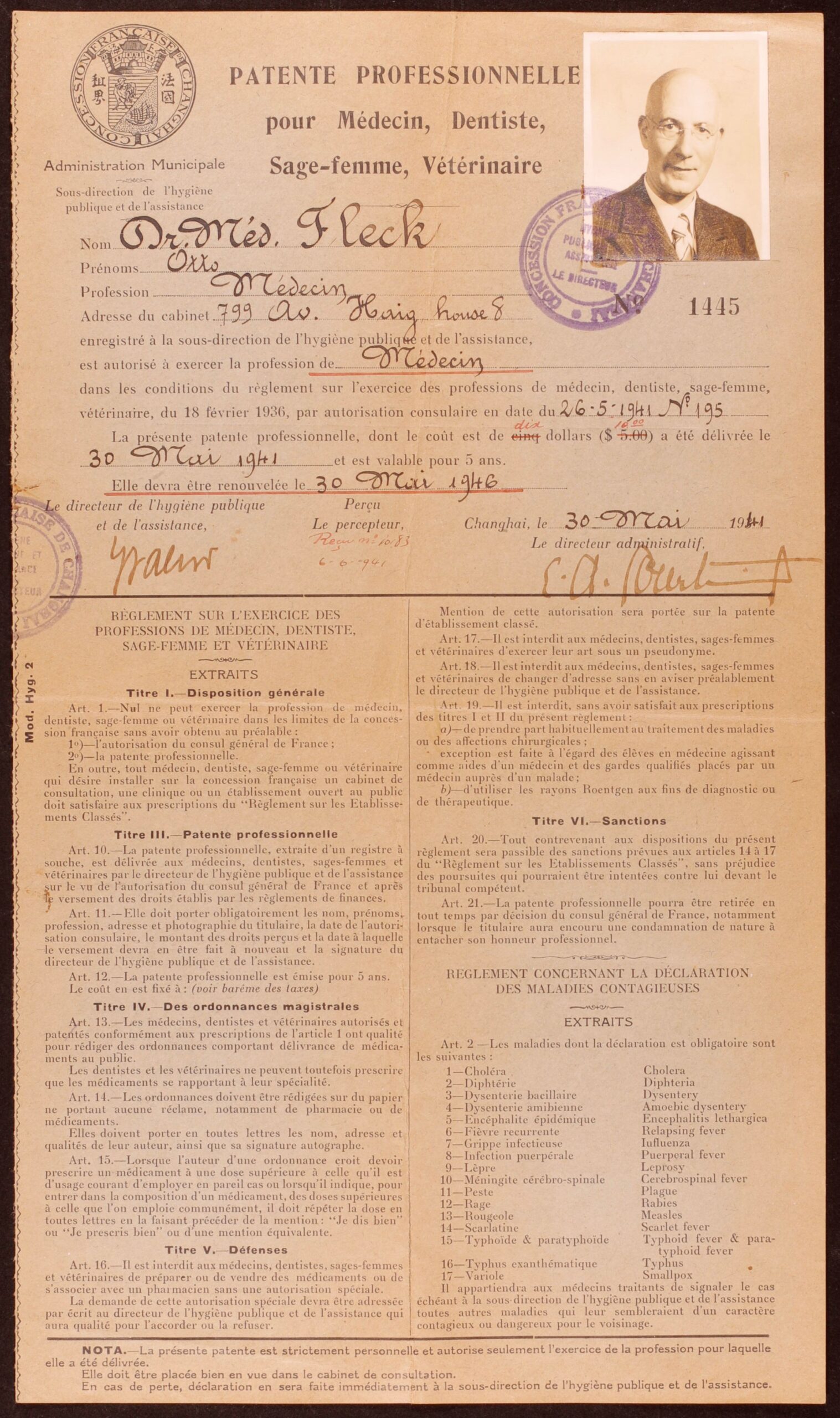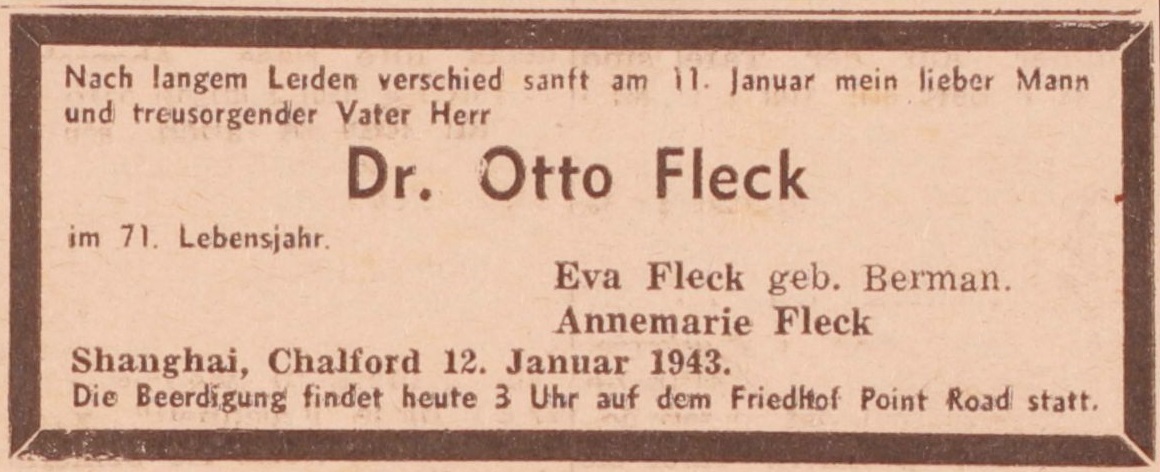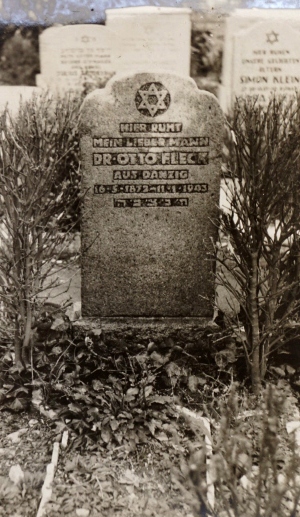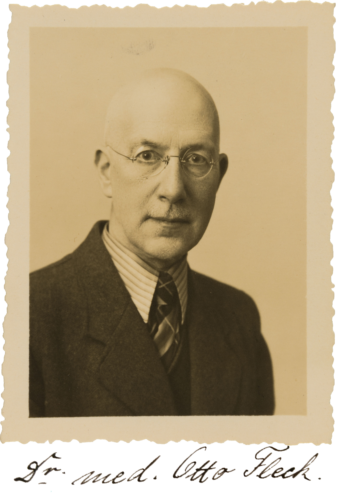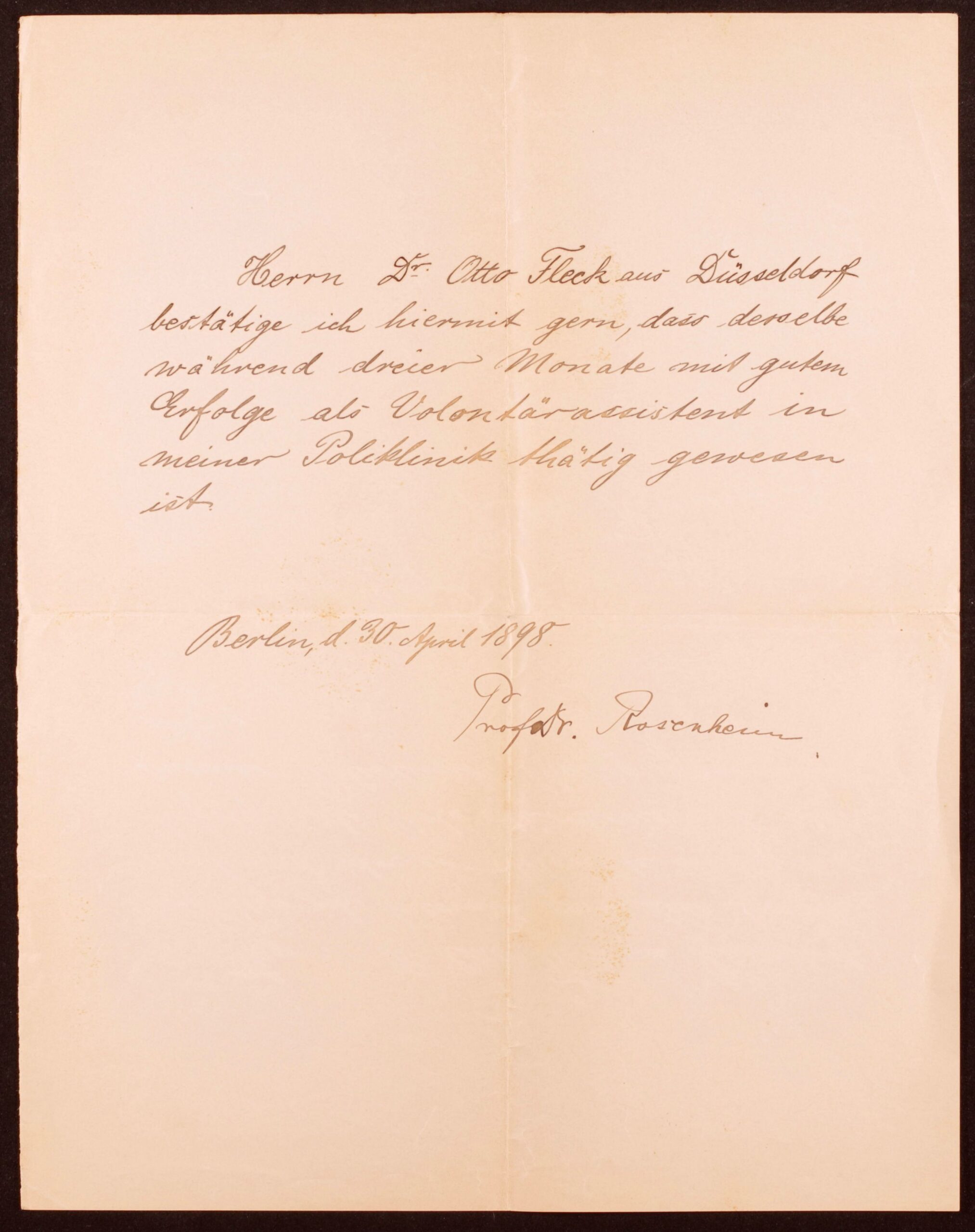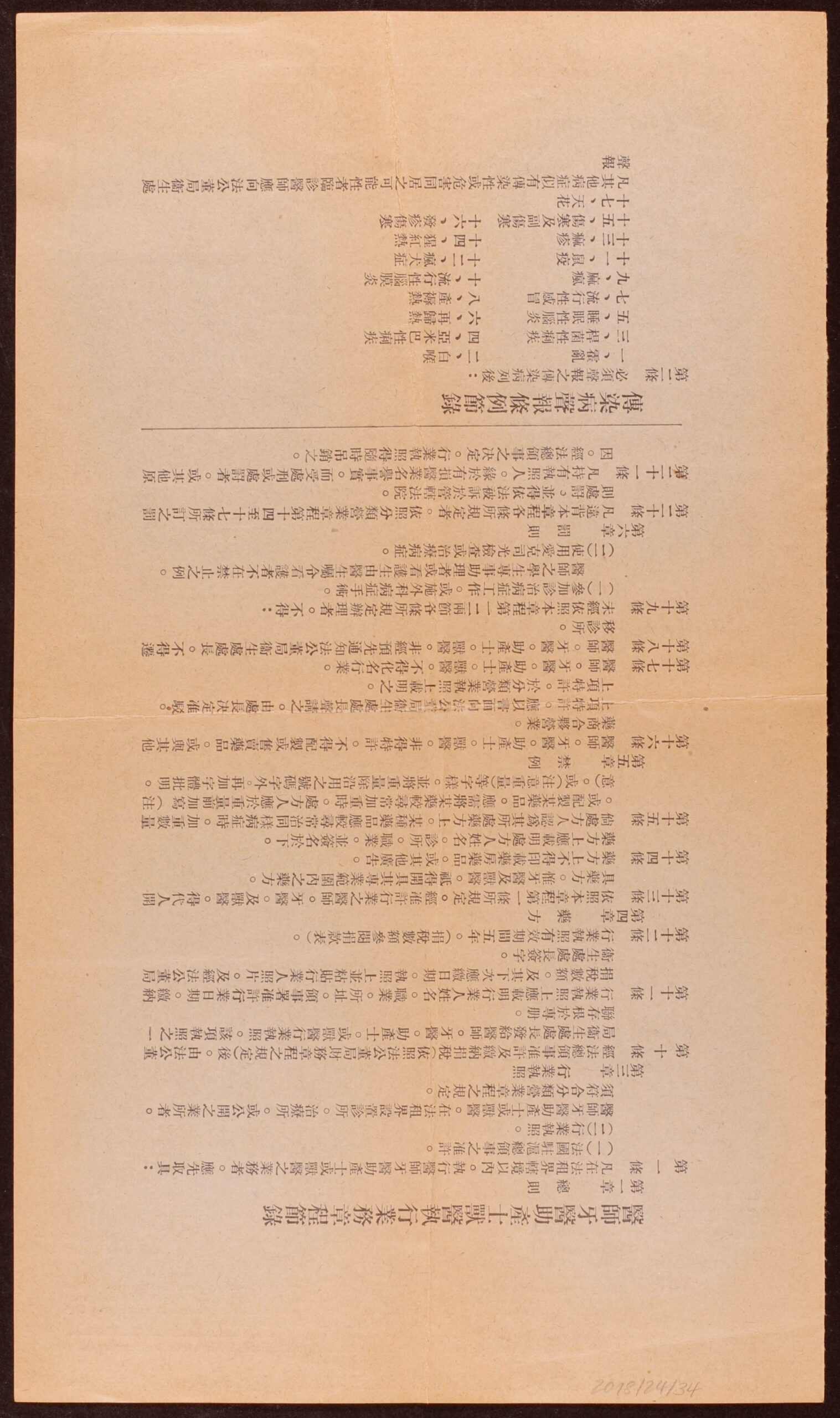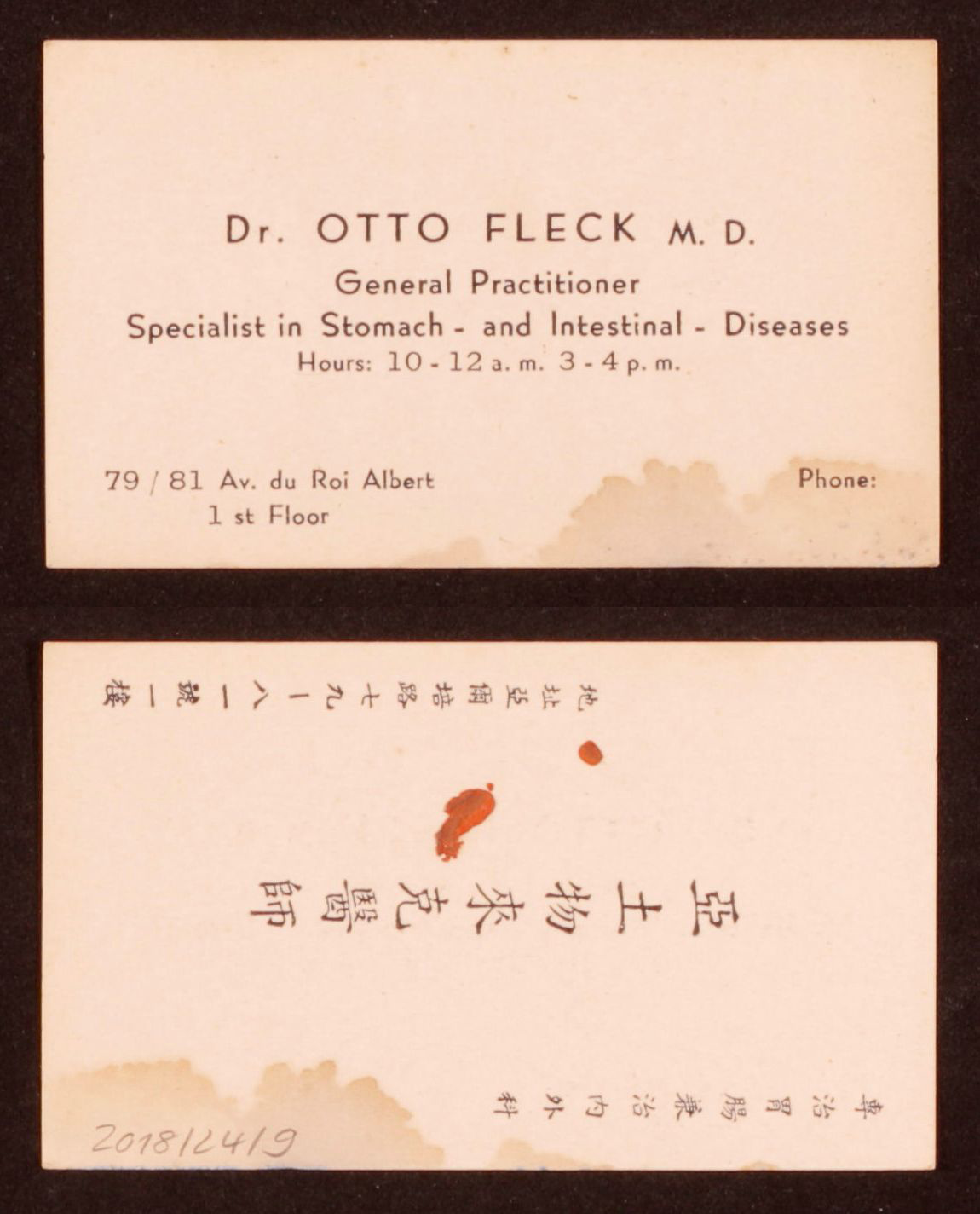Dr. med. Otto Fleck
- Düsseldorf, 16.05.1872
- Shanghai, China, 11.01.1943
- Member since 1925
- Escaped to China in 1940
- Gdańsk
- Specialist in gastrointestinal and metabolic diseases in private practice
“I was born as the son of the merchant Louis Fleck in Düsseldorf on 16 May 1872. Confession Israelite. I enjoyed my school education at the Royal Grammar School in Düsseldorf. After receiving my school leaving certificate on Easter 1890, I devoted myself to the study of medicine and studied one semester each at the universities of Freiburg i. B., Bonn, Königsberg and eight semesters at the University of Munich. At the latter I passed the preliminary medical examination at the beginning of the winter semester 1892/93, obtained my doctorate in the summer semester 1894 and passed the state medical examination one year later in 1895”, Otto Fleck stated in a curriculum vitae dated 12 September 1896 (Otto Fleck’s estate, Jewish Museum Berlin, Bundle/497, 1311, Mp 1, 2028/24/1-4 ). Fleck’s mother was Julie Fleck, née Hirschland.
Education and Workplaces
Otto Fleck wrote his doctoral thesis on “Zur Aetiologie der spontanen Hirnblutung im mittleren und jugendlichen Alter” at the Ludwig Maximilian University in Munich. He wrote the thesis upon the suggestion of the pathologist Otto von Bollinger and with the support of his colleague Hans Schmaus. Otto Fleck received his medical licence in 1895.
After graduating, Fleck spent three months as a trainee doctor with the neurologist Emanuel Mendel at his Berlin Polyclinic for Nervous Diseases and over six months as an assistant doctor at the Department of Internal Medicine at the Am Urban Municipal Hospital in Berlin. His early specialisation in the new field of gastroenterology was a result of his work at the Berlin polyclinic of the dietician and metabolic researcher Curt Pariser. Pariser was closely associated with Ismar Boas belonged to the circle of co-founders of the Society for Digestive and Metabolic Diseases in 1912 and played a decisive mediating role in the organisation of the First Conference for Digestive and Metabolic Diseases in Bad Homburg in 1914. Fleck also trained at Theodor Rosenheim’s polyclinic. Rosenheim was one of the early gastroenterologists in Berlin, had received much of his training at the III Medical University Clinic of the Charité under Hermann Senator and was involved with endoscopy as well as with the still new clinical picture of ulcerative colitis from an early stage.
Otto Fleck settled as a specialist in gastrointestinal diseases in Gdansk in 1898. He was one of the first gastroenterologists to set up practice outside of Berlin. Fleck ran a successful and highly respected practice for the following thirty-five years until 1933. Fleck was active in the Medical Association in Gdansk and was a member of the city’s Natural History Society. He was conferred the honorary title of “Sanitätsrat” in 1918 in recognition of his services.
He married Eva Beermann, a medical-technical assistant and daughter of Dr. Max Beermann, a rabbi working in Heilbronn, in January 1925. Their daughter Anne Marie Fleck was born in January 1926.
After 1933
The National Socialists won an absolute majority in the “Free City” of Danzig in the Volkstag, the Free City’s Parliament (People’s Diet) elections in May 1933. The Free City of Danzig was under the supervision of the League of Nations at the time. After having won the elections, the Nazis increasingly enforced anti-Jewish measures, such as excluding Jews from professional associations from August 1933 onwards.
Otto Fleck suffered a nervous breakdown in 1933. He attempted suicide in 1934, which he survived through a swift operation. As a result, he became unable to work, had to give up his practice in 1934 and lived on a disability pension. Otto Fleck found relief in music. He played the violin in the orchestra of the Jewish Cultural Association in Danzig. The discrimination and persecution of Jews increased after the November pogrom in 1938. Fleck lost his medical licence under Nazi legislation in 1938.
The Flecks decided to save their 13-year-old daughter by sending her to England on a Kindertransport in May 1939. Anne Marie Fleck found foster parents, who took her into their care in Chalford, near the town of Stroud in the county of Gloucestershire. The Fleck family’s efforts to escape from Germany to the USA or Latin America initially failed due to a lack of visas and subsequently proved unsuccessful. Fleck, as a Jew, no longer received an invalidity pension from 1939 onwards. After a warning of imminent arrest, the Flecks fled Gdansk in February 1940, lived temporarily in Berlin and finally reached Shanghai in May 1940 on the S.S. Conte Rosso from Trieste via one of the few remaining escape routes. Otto Fleck was able to work in Shanghai as a doctor for some time until he fell ill again.
Otto Fleck died after a 15-month illness in Shanghai at the age of 70 on 11 January 1943. His gravesite is located at Point Road Cemetery, one of Shanghai’s four Jewish cemeteries at the time.
His wife Eva Fleck was able to get out of China and into the USA to San Francisco in January 1947, from which point she lived in Berkeley. Their daughter Anne Marie Fleck, who had started an apprenticeship in London, moved to the USA in May 1948, where she met her mother again after nine years. Eva Fleck died in Los Angeles in 1983. Their daughter Anne Marie also died in 2010, also in Los Angeles.
Acknowledgements
We are exceptionally grateful to Aubrey Pomerance, head of the archives at the Jewish Museum Berlin, and Franziska Bogdanov, scientific documentalist, also at the Jewish Museum Berlin, for their great willingness to help and their cooperation. Without their support, this biographical page on Otto Fleck would not have been possible.
Biography translated by Rachel Hinterthan-Nizan
Sources and Further Reading
Sources